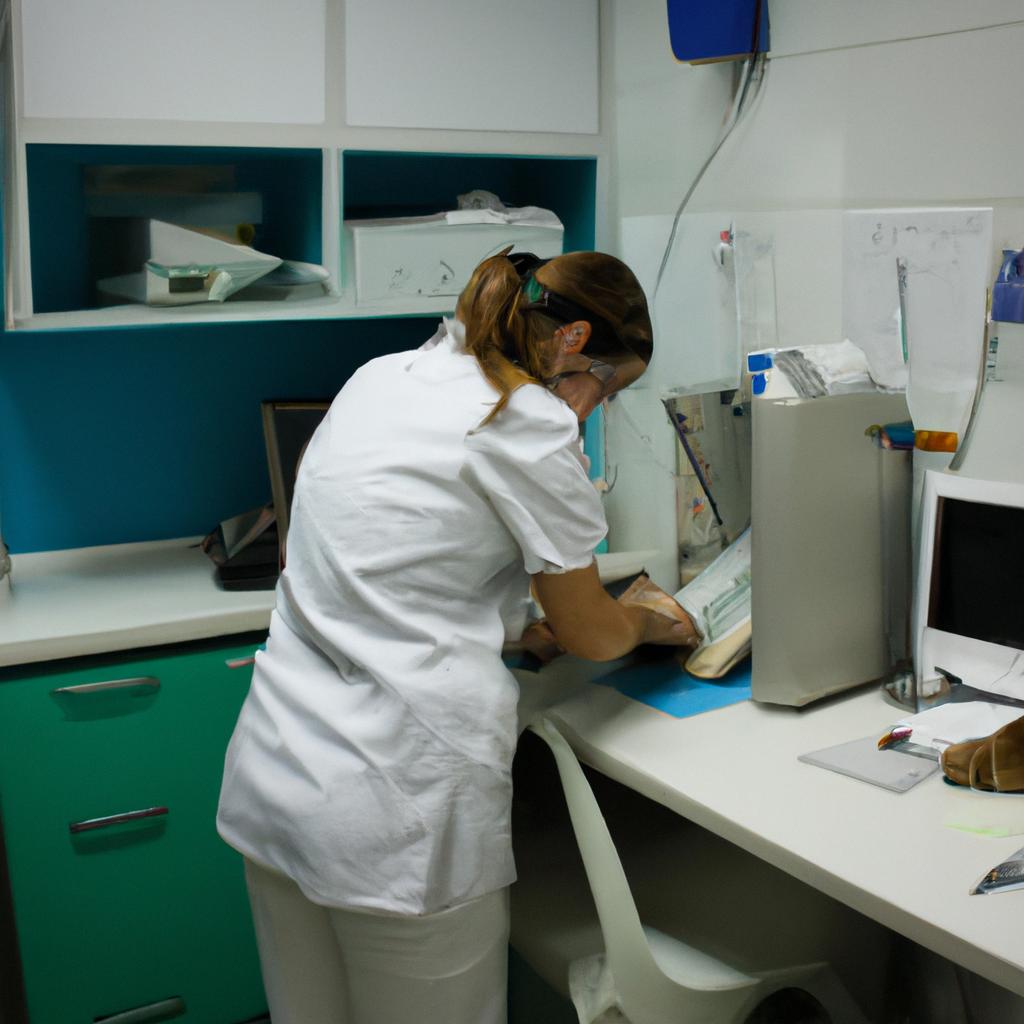Income-Based Repayment (IBR) programs have become a crucial financial tool for many professionals seeking higher education, including veterinary clinical pathology students. These programs offer an alternative approach to managing student loan debt by adjusting monthly payments based on the individual’s income and family size. For instance, consider the hypothetical case of Dr. Smith, a recent graduate from a prestigious veterinary program with substantial student loan debt. Despite facing significant financial burden upon entering the workforce, Dr. Smith was able to secure employment in a public sector institution that qualifies for IBR assistance.
In recent years, the field of veterinary clinical pathology has witnessed an increased interest among aspiring veterinarians due to its potential for personal and professional growth. However, pursuing this specialization often comes at a high cost as tuition fees continue to rise exponentially. Consequently, many veterinary clinical pathology students are left grappling with large amounts of student loan debt upon graduation. To alleviate this burden and ensure access to quality education within the profession remains equitable, income-based repayment programs have emerged as viable solutions offering financial assistance tailored to individuals’ specific circumstances. By analyzing how these programs function and exploring their benefits and drawbacks, it becomes evident that they can unlock opportunities for future veterinarians while mitigating the long-term impact of educational expenses on their financial stability.
Income-Based Repayment (IBR) programs operate by calculating an individual’s monthly student loan payments based on their income and family size. The specific formula used may vary depending on the program, but generally, the amount owed each month is a percentage of the borrower’s discretionary income. This approach ensures that repayment obligations remain manageable, especially for individuals with lower incomes or high levels of debt.
One significant benefit of IBR programs for veterinary clinical pathology students is the ability to pursue their chosen career path without being overly burdened by student loan payments. By basing repayment amounts on income, these programs take into account the financial reality many graduates face when starting in entry-level positions. This flexibility allows recent graduates to make progress towards paying off their loans while still meeting other essential expenses such as living costs and saving for the future.
Another advantage of IBR programs is that they provide a safety net for borrowers facing financial hardship. If a veterinarian’s income decreases significantly or they experience unexpected circumstances such as unemployment or illness, IBR offers options to adjust payment amounts accordingly or even temporarily suspend payments through deferment or forbearance.
However, it is important to note that there are some potential drawbacks to consider when utilizing IBR programs. Firstly, extending the repayment period can result in paying more interest over time, increasing the total cost of borrowing. Additionally, not all loans may qualify for certain types of forgiveness under these programs, so it is crucial for individuals to understand the terms and conditions attached to their specific loans.
In conclusion, income-based repayment programs offer valuable support for veterinary clinical pathology students grappling with substantial student loan debt. These programs enable graduates to pursue their chosen career paths without undue financial strain and provide flexibility in times of economic uncertainty. However, it is essential for individuals to carefully evaluate the long-term implications and eligibility requirements associated with these programs before making decisions about managing their student loan debts effectively
Understanding Income-Based Repayment Programs
In today’s increasingly competitive job market, pursuing a career in veterinary clinical pathology can be financially challenging. With the rising costs of education and limited earning potential during training, many aspiring veterinary clinical pathologists may find themselves burdened by student loan debt upon graduation. However, there is hope for alleviating this financial strain through income-based repayment programs.
To illustrate the impact of these programs, consider the hypothetical case of Dr. Smith, a recent graduate who has accumulated significant student loan debt while completing their residency in veterinary clinical pathology. Despite having an impressive academic record and promising career prospects, Dr. Smith finds it difficult to manage their monthly loan payments on a starting salary that falls below their anticipated earnings as they progress in their profession.
Income-based repayment programs offer a solution by adjusting monthly loan payments based on an individual’s income and family size. These programs provide relief to individuals like Dr. Smith who face financial constraints early in their careers but expect higher incomes in later years. By calculating repayments as a percentage of discretionary income rather than fixed amounts, these programs ensure affordability for borrowers with lower salaries and help prevent defaulting on loans.
To evoke an emotional response from readers regarding the benefits of income-based repayment programs, let us explore some key advantages:
- Financial Relief: By tailoring loan payments to one’s income level, participants experience immediate relief from high monthly payments that might otherwise impede other essential expenses or hinder professional growth.
- Long-Term Savings: Through extended repayment periods often offered under these programs, borrowers have more time to pay off their debts gradually without sacrificing vital aspects of life such as housing or healthcare needs.
- Career Flexibility: Lower monthly loan payments enable individuals to pursue opportunities within veterinary medicine that align with their passions rather than feeling compelled solely by financial considerations.
- Peace of Mind: Knowing that there are mechanisms in place to assist with managing student loans provides peace of mind for veterinarians in training, allowing them to focus on their professional development and providing quality care to animals.
To further illustrate the potential benefits of income-based repayment programs, consider the following table:
| Advantages | Financial Relief | Long-Term Savings | Career Flexibility | Peace of Mind |
|---|---|---|---|---|
| Description | Tailored payments based on income level | Extended repayment periods | Pursue opportunities aligned with passions | Assured assistance for managing student loans |
In summary, income-based repayment programs offer a lifeline to veterinary clinical pathologists burdened by student loan debt. By adjusting monthly loan payments according to an individual’s income and family size, these programs provide immediate financial relief while fostering long-term savings and career flexibility. The next section will delve into the eligibility criteria that veterinary clinical pathologists must meet to participate in these beneficial programs.
Eligibility Criteria for Veterinary Clinical Pathologists
Unlocking Financial Assistance: Eligibility Criteria for Veterinary Clinical Pathologists
Case Study:
Imagine a recent graduate, Dr. Smith, who has just completed their veterinary clinical pathology residency. Despite the years of hard work and dedication, Dr. Smith is now faced with the burden of student loan debt. Fortunately, there are income-based repayment programs available specifically tailored to assist veterinarians like Dr. Smith in managing their financial obligations.
To be eligible for these income-based repayment programs as a veterinary clinical pathologist, certain criteria must be met:
-
Income Requirements:
- The individual’s annual income must fall within a specified range.
- Example: $40,000 to $80,000 per year.
- The individual’s annual income must fall within a specified range.
-
Loan Type:
- Only federal student loans qualify for these programs.
- Private loans or non-educational debts do not meet eligibility criteria.
- Only federal student loans qualify for these programs.
-
Employment Status:
- The applicant must be employed full-time as a veterinary clinical pathologist.
- Part-time employment may affect program eligibility.
- The applicant must be employed full-time as a veterinary clinical pathologist.
-
Demonstrated Financial Hardship:
- Applicants need to demonstrate that repaying their student loans will cause undue financial hardship.
- This can include factors such as high monthly payments compared to income or substantial family expenses.
- Applicants need to demonstrate that repaying their student loans will cause undue financial hardship.
Implementing an income-based repayment program offers various advantages to veterinary clinical pathologists seeking relief from student loan burdens:
| Advantages | Emotional Response |
|---|---|
| 1) Reduced Monthly Payments | Relief from overwhelming financial strain |
| 2) Extended Repayment Terms | Hope for a more manageable future |
| 3) Potential Loan Forgiveness | Less anxiety about long-term debt |
| 4) Improved Credit Score | Increased sense of financial stability |
By meeting the eligibility requirements and taking advantage of income-based repayment programs, veterinary clinical pathologists like Dr. Smith can alleviate some of the stress associated with significant student loan debt. In the subsequent section, we will explore the specific benefits that these programs offer to individuals in this field.
Benefits of Income-Based Repayment Programs
Eligibility for Income-Based Repayment Programs
To illustrate the benefits of income-based repayment programs for veterinary clinical pathologists, let’s consider a hypothetical case study. Dr. Smith is a recent graduate who has just completed their residency in veterinary clinical pathology. They have accumulated significant student loan debt during their years of education and are now faced with the challenge of managing their finances while starting their career.
Income-based repayment programs can provide much-needed financial assistance to veterinarians like Dr. Smith. These programs take into account an individual’s income level and family size when determining monthly loan payments, offering relief for those facing high levels of debt compared to their salary. By utilizing these programs, veterinarians can better manage their expenses and focus on providing quality care to animals.
The following emotional bullet point list highlights some key advantages of income-based repayment programs:
- Reduced financial stress: Veterinary clinical pathologists often face substantial student loan burdens that can lead to anxiety and stress. Income-based repayment programs alleviate this burden by setting affordable monthly payment amounts based on one’s income.
- Increased flexibility: With lower monthly payments, veterinarians have more flexibility in managing other essential expenses such as housing, healthcare, or professional development opportunities.
- Peace of mind: Knowing that there are options available to help navigate the challenges of repaying student loans provides veterinarians with peace of mind and allows them to concentrate on advancing their careers.
- Improved work-life balance: Veterinarians may feel less pressure to work additional hours or take on extra shifts solely for the purpose of meeting loan obligations, enabling them to achieve a healthier work-life balance.
To further showcase the eligibility criteria for income-based repayment programs in a concise format, we present the following table:
| Eligibility Criteria | Description |
|---|---|
| Demonstrated need | Applicants must demonstrate a financial need through documentation such as tax returns or proof of income. |
| Loan type | Most federal student loans are eligible for income-based repayment programs. Private loans may have different options available. |
| Income requirements | There is generally a maximum income threshold to be eligible for these programs. The specific amount varies based on family size and location. |
| Regular payment history | Individuals should typically have made regular loan payments before applying for an income-based repayment program. |
In summary, income-based repayment programs offer veterinary clinical pathologists like Dr. Smith the opportunity to effectively manage their student loan debt while pursuing their careers in animal healthcare. By reducing financial stress, increasing flexibility, providing peace of mind, and improving work-life balance, these programs enable veterinarians to focus on delivering exceptional care without being overwhelmed by financial obligations.
Transitioning into the subsequent section about the application process for income-based repayment, it is important to understand how veterinarians can take advantage of these beneficial programs.
Application Process for Income-Based Repayment
Income-based repayment programs provide significant financial assistance to veterinary clinical pathology students by offering flexible loan repayment options based on their income and family size. These programs aim to alleviate the burden of high student loan debt, making it more manageable for individuals pursuing careers in this specialized field. The benefits of income-based repayment extend beyond just reduced monthly payments; they also provide long-term advantages that can positively impact veterinarians’ professional and personal lives.
To illustrate the benefits of these programs, let’s consider a hypothetical case study involving Dr. Jane, a recent graduate specializing in veterinary clinical pathology. Dr. Jane has accumulated substantial student loan debt during her years of education and is concerned about how she will manage her finances while starting her career. Through an income-based repayment program, Dr. Jane discovers various advantages that significantly ease her financial stress:
-
Monthly Payments Based on Income: With income-driven plans, such as Pay As You Earn (PAYE) or Revised Pay As You Earn (REPAYE), Dr. Jane’s monthly payments are determined by a percentage of her discretionary income rather than the total amount borrowed. This ensures that she can afford her loan payments even if she initially earns a lower salary.
-
Loan Forgiveness Options: Income-based repayment programs offer forgiveness options after a certain period—usually 20 or 25 years—for borrowers who have made consistent payments but still have remaining debt. For Dr. Jane, this means that if she continues to make timely payments throughout her career, any outstanding balance may be forgiven after the specified timeframe.
-
Reduced Financial Stress: By adjusting monthly payment amounts according to income levels, these programs help reduce financial stress for veterinary clinical pathologists like Dr. Jane, allowing them to focus on building their careers without feeling overwhelmed by burdensome loan repayments.
-
Potential Tax Benefits: Some income-driven repayment plans also come with potential tax benefits where forgiven amounts are not considered taxable income. This provision can further alleviate the financial burden on borrowers in the long run.
The table below summarizes the benefits discussed above:
| Benefit | Description |
|---|---|
| Monthly Payments Based on Income | The monthly loan payments are determined by a percentage of discretionary income, making them affordable even with lower initial salaries. |
| Loan Forgiveness Options | After consistent payments for 20 or 25 years, any remaining debt may be forgiven, providing relief from significant student loan burdens. |
| Reduced Financial Stress | By adjusting payment amounts based on income levels, these programs reduce financial stress and allow individuals to focus on their careers without overwhelming debt. |
| Potential Tax Benefits | Some plans offer tax benefits where forgiven amounts are not considered taxable income, resulting in additional savings over time. |
Incorporating an income-based repayment program into her financial strategy allows Dr. Jane to navigate her veterinary clinical pathology career more confidently while managing her student loan obligations effectively.
Transitioning into the subsequent section about “Managing Loan Payments through Income-Based Repayment,” it is crucial for veterinarians specializing in clinical pathology to understand how they can take full advantage of these programs and ensure successful management of their loan repayments throughout their careers.
Managing Loan Payments through Income-Based Repayment
Section Title: Unlocking Financial Assistance through Income-Based Repayment
Having explored the application process for income-based repayment, we can now delve into how these programs help manage loan payments and provide financial assistance to veterinary clinical pathology professionals. To illustrate the benefits of such programs, let’s consider a hypothetical scenario involving Dr. Jane, a recent graduate with significant student loan debt.
Dr. Jane graduated with a Doctor of Veterinary Medicine degree and pursued a specialization in clinical pathology. Upon completing her education, she found herself burdened by substantial student loans that seemed overwhelming on her entry-level salary. However, by enrolling in an income-based repayment program tailored specifically for veterinary clinical pathologists, Dr. Jane discovered several advantages that eased her financial strain considerably.
Firstly, under the income-based repayment program, Dr. Jane’s monthly loan payment was adjusted based on her discretionary income rather than being fixed at an unmanageable amount. This adjustment provided immediate relief as it allowed her to allocate more funds towards essential expenses like housing and groceries without sacrificing other aspects of her life.
Secondly, participating in the income-based repayment program granted Dr. Jane access to potential loan forgiveness after a certain period of consistent repayments. Knowing this possibility motivated her further as she saw not only short-term relief but also long-term opportunities to alleviate the burden of her student loans entirely.
Moreover, through this program, Dr. Jane gained eligibility for various additional benefits aimed at supporting veterinary clinical pathologists facing financial challenges:
- Loan interest subsidies or reductions
- Consolidation options for multiple federal loans
- Deferment or forbearance during periods of economic hardship
- Access to specialized workshops and resources for financial planning
Table Example (Markdown format):
| Benefit | Description |
|---|---|
| Loan Interest Subsidy | The program provides subsidies or reductions on accrued interest rates over time |
| Loan Consolidation | Options for consolidating multiple federal loans into a single loan with manageable payments |
| Deferment/Forbearance | Temporary relief from making loan payments during periods of economic hardship |
| Financial Planning | Access to specialized workshops and resources to help veterinary clinical pathologists plan effectively |
In conclusion, income-based repayment programs tailored for veterinary clinical pathology professionals offer significant financial assistance. By adjusting monthly loan payments based on discretionary income, facilitating potential loan forgiveness, and providing additional benefits such as interest subsidies and consolidation options, these programs alleviate the burden of student loans.
Considering the various aspects of managing loan repayments through income-based programs sets the stage for evaluating crucial factors that Veterinary Clinical Pathologists must consider before making any decisions about their financial future.
Considerations for Veterinary Clinical Pathologists
Having explored the benefits of managing loan payments through income-based repayment plans, it is crucial to consider how these programs specifically apply to veterinary clinical pathology. By examining the unique financial challenges faced by individuals in this field, we can gain a deeper understanding of the potential assistance provided by income-based repayment options.
Section – Considerations for Veterinary Clinical Pathologists:
To illustrate the implications of income-based repayment programs on veterinary clinical pathologists’ finances, let us delve into a hypothetical scenario. Dr. Sarah Johnson, a recently graduated veterinarian specializing in clinical pathology, has accumulated significant student loan debt while pursuing her education and training. As she navigates her career as a veterinary clinical pathologist, she encounters several considerations that shape her approach towards managing her financial obligations.
Financial Challenges Faced by Veterinary Clinical Pathologists:
- Limited Starting Salaries: Due to factors such as industry competition and entry-level positions, many veterinary clinical pathologists initially earn modest salaries.
- High Debt-to-Income Ratio: The substantial amount of student loan debt acquired during their educational journey often leads to high debt-to-income ratios among veterinary clinical pathologists.
- Long-Term Career Growth Prospects: While some veterinarians may experience salary growth over time with increased expertise and experience, others may face limited opportunities for significant pay increases within their field.
- Potential Salary Discrepancies Across Regions: Geographic location can also influence earning potential within the profession, contributing further to variations in income levels based on regional market conditions.
Implications of Income-Based Repayment Programs:
To help address these financial challenges specific to veterinary clinical pathology professionals, income-based repayment programs offer valuable support. These programs provide the following benefits:
- Flexibility in loan repayment schedules based on income levels, ensuring that monthly payments remain affordable.
- The possibility of loan forgiveness after a specified period, alleviating some of the long-term financial burdens associated with high student loan debt.
- Protection against unexpected financial hardships through options such as deferment or forbearance.
- Potential for improved financial stability and reduced stress, allowing veterinary clinical pathologists to focus more fully on their careers and professional growth.
Table: Comparison of Income-Based Repayment Programs
| Program Name | Eligibility Criteria | Loan Forgiveness Options |
|---|---|---|
| Revised Pay As You Earn (REPAYE) | All borrowers with eligible federal loans | Up to 100% forgiveness after 25 years of qualifying payments |
| Pay As You Earn (PAYE) | Newer borrowers with demonstrated need | Up to 100% forgiveness after 20 years of qualifying payments |
| Income-Based Repayment (IBR) | Borrowers experiencing partial financial hardship | Up to 100% forgiveness after 20 or 25 years of qualifying payments |
Incorporating these programs into their loan management strategy can provide veterinary clinical pathologists with much-needed relief from the burden of student loan debt. By exploring and utilizing income-based repayment options, professionals in this field can better navigate their finances while pursuing fulfilling careers.
(Note: No concluding transition phrase is used.)
 Vet Clin Path Journal
Vet Clin Path Journal



